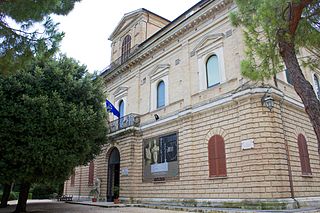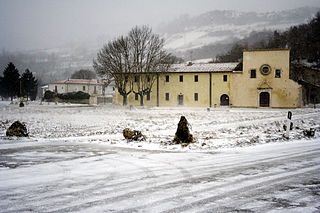
Abruzzo, historically known as Abruzzi, is a region of Southern Italy with an area of 10,763 square km and a population of 1.3 million. It is divided into four provinces: L'Aquila, Teramo, Pescara, and Chieti. Its western border lies 80 km (50 mi) east of Rome. Abruzzo borders the region of Marche to the north, Lazio to the west and north-west, Molise to the south and the Adriatic Sea to the east. Geographically, Abruzzo is divided into a mountainous area in the west, which includes the highest massifs of the Apennines, such as the Gran Sasso d'Italia and the Maiella, and a coastal area in the east with beaches on the Adriatic Sea.

The province of Pescara is a province in the Abruzzo region of Italy. Its provincial capital is the city Pescara, which has a population of 119,483 inhabitants. As of 2017, it has a total population of 319,936 inhabitants over an area of 1,230.33 square kilometres (475.03 sq mi). The provincial president is Antonio Zaffiri and the province contains 46 comuni.

Giulianova Calcio S.r.l. was an Italian association football club based in Giulianova, Abruzzo. The team failed to renew its license for professional football in 2012. After 4 years' dormancy, the new owner of the club applied to play in 2016–17 5-a-side football, composed of players from folded Città di Giulianova.

Celano is a town and comune in the Province of L'Aquila, central Italy, 120 km (75 mi) east of Rome by rail.

Tagliacozzo is a town and comune in the province of L'Aquila, Abruzzo, central Italy. It is a member of the I Borghi più belli d'Italia association.

Cerchio is a comune and town in the province of L'Aquila in the Abruzzo region of southern Italy.

Marsica is a geographical and historical region in the Abruzzo, central Italy, including 37 comuni in the province of L'Aquila. It is located between the plain of the former Fucine Lake, the National Park of Abruzzo, Lazio and Molise, the plain of Carsoli and the valley of Sulmona.

Tourism in Abruzzo has become one of the most prosperous sectors in the economy of Abruzzo, and in recent years has seen a remarkable growth attracting numerous tourists from Italy and Europe. According to statistics, in 2021 arrivals totaled 1,330,887. A total of 5,197,765 arrivals were tourists, a figure that puts the region seventeenth among the Italian regions for numbers of tourists per year. A moderate support to tourism is also given to the Abruzzo Airport with many low cost and charter flights connecting the entire region with the rest of Europe.

Castello Piccolomini is a castle in Celano, Province of L'Aquila (Abruzzo).

Castello di Salle is a Middle Ages castle in Salle, Province of Pescara, Abruzzo, Italy.

Lucus Angitiae was an Italic and Roman town and sanctuary with temple of the goddess Angitia, the ruins of which are located in the comune of Luco dei Marsi in the Abruzzo region of Italy.

Museo Archeologico Nazionale d'Abruzzo is an archaeology museum in Chieti, Abruzzo.

Museo d'Arte Sacra della Marsica is a museum of religious art in Celano, Province of L'Aquila (Abruzzo).

Museo Civico di Teramo is an art museum in Teramo, Abruzzo.

Museo archeologico Francesco Savini is an archaeology museum in Teramo, Abruzzo.

Museo civico aufidenate is an archaeology museum in Castel di Sangro, Province of L'Aquila (Abruzzo).

Museo civico di Cerchio is a museum of religious art in Cerchio, Province of L'Aquila (Abruzzo).

Museo capitolare di Atri is a museum of religious art in Atri, Province of Teramo (Abruzzo).
Museo Archeologico Nazionale di Campli is an archaeology museum in Campli, Abruzzo.

The Basilio Cascella Civic Museum is an Italian pinacotheca based in Pescara in the Porta Nuova district. The museum is located in the former lithographic establishment established at the end of the nineteenth century by the painter Basilio Cascella. The building, for half a century the center of artistic production and meeting place for intellectuals such as Gabriele D'Annunzio, Luigi Pirandello, and Giovanni Pascoli, was donated to the Comune of Pescara in 1966 by the heirs of Cascella.




















